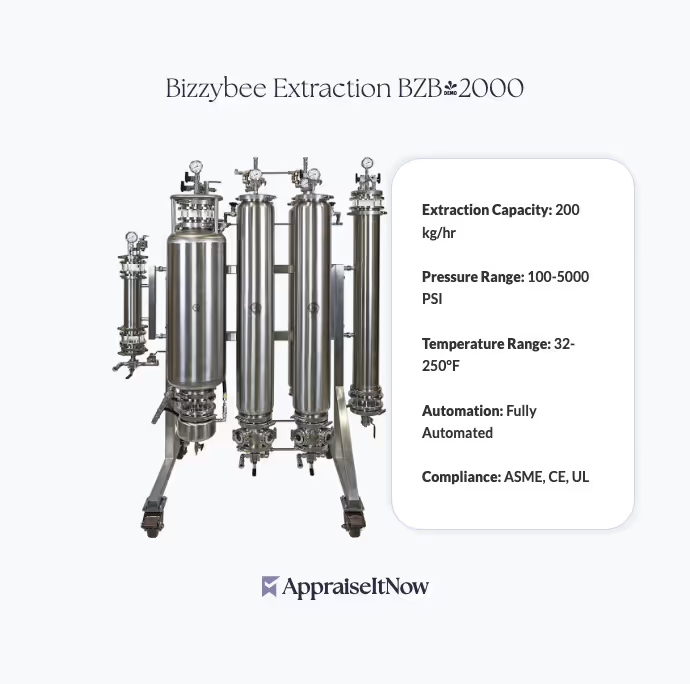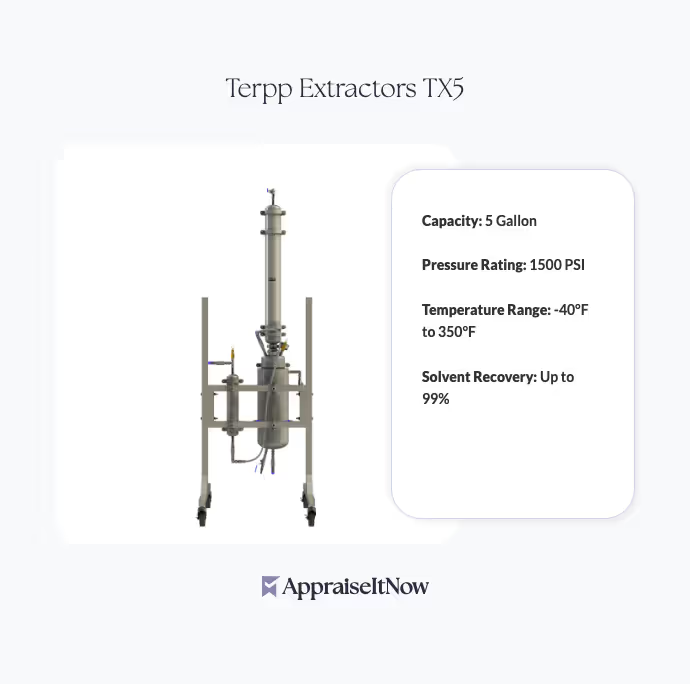<h1>How to Get Your Bizzybee Extraction BZB-2000 Appraised</h1>
<p>The Bizzybee Extraction BZB-2000 represents a sophisticated investment in extraction technology, with current market valuations ranging from <strong>$175,000 to $195,000</strong>. Whether you're evaluating this equipment for purchase, sale, insurance, financing, or estate purposes, understanding what drives its appraisal value and how to document it properly ensures you receive an accurate, defensible valuation from credentialed experts.</p>
<h2>Understanding BZB-2000 Market Value</h2>
<p>The BZB-2000 commands premium pricing due to its patented extraction technology, robust stainless steel construction, and proven track record since its introduction in 2018. This industrial-grade equipment delivers consistent high-purity botanical extracts across pharmaceutical, food and beverage, and specialized extraction markets. Its sophisticated design combines advanced closed-loop solvent recovery systems with intuitive touchscreen controls, positioning it at the higher end of extraction equipment valuations.</p>
<p>When you seek an appraisal for your BZB-2000, professional valuers assess its positioning within the <strong>$175,000-$195,000</strong> range based on condition, operational hours, maintenance history, and current market demand. The equipment's relatively recent introduction means strong resale channels exist for units in good working condition, though market demand fluctuates based on regulatory changes and industry consolidation.</p>
<div class="callout tip"><p><strong>Valuation Driver</strong></p>
<p>Units with complete maintenance documentation and lower operational hours typically command valuations toward the upper range of estimates.</p></div>
<h2>Key Factors That Influence BZB-2000 Appraisal Value</h2>
<h3>Age and Operational Hours</h3>
<p>The BZB-2000's manufacturing date and cumulative operating hours represent primary value determinants. A unit manufactured in 2018 with documented maintenance records and moderate usage hours may retain 85-95% of original purchase value, while heavily used equipment or models requiring significant repairs could see 30-50% reductions. Professional appraisers examine serial number dates, hour-meter readings, and service logs to establish accurate age assessment and remaining useful life assumptions within the cannabis and botanical extraction equipment sector.</p>
<h3>Maintenance and Repair History</h3>
<p>Your equipment's operational track record significantly impacts valuation. Complete maintenance logs demonstrating regular servicing, parts replacement, and system updates add substantial value credibility. Conversely, equipment with spotty documentation or evidence of deferred maintenance faces appraisal discounts reflecting higher repair risk. Professional <a href="/types/equipment-and-machinery">equipment and machinery appraisals</a> require detailed service records showing adherence to manufacturer specifications and proper operational protocols.</p>
<h3>Technical Condition and Modifications</h3>
<p>The BZB-2000's physical condition directly affects market value. Original factory components command premium pricing compared to units with aftermarket modifications or missing parts. Specialized equipment like extraction systems become problematic when third-party modifications compromise safety certifications or warranty coverage. Professional appraisers assess whether any upgrades enhance functionality or violate manufacturer specifications, as this distinction critically impacts both value and marketability.</p>
<h3>Regulatory and Compliance Documentation</h3>
<p>If your BZB-2000 operated in licensed extraction facilities, comprehensive regulatory compliance documentation becomes essential for appraisal accuracy. This includes state licensing records, product formulation documentation, safety certifications, and facility inspection reports. Equipment previously used in unlicensed operations faces significant appraisal challenges and reduced marketability. Professional valuers understand how regulatory history affects both pricing and buyer pool size when establishing fair market value for <a href="/types/cannabis-equipment">cannabis equipment</a>.</p>
<div class="callout note"><p><strong>Compliance Factor</strong></p>
<p>Equipment with documented use in state-licensed facilities typically achieves appraisals 15-25% higher than comparable units with uncertain regulatory history.</p></div>
<h2>Documentation Required for Professional Appraisal</h2>
<h3>Essential Records and Evidence</h3>
<p>Obtaining an accurate BZB-2000 appraisal requires compiling specific documentation that validates equipment specifications, condition, and operational history. You should gather the original purchase invoice establishing acquisition date and cost basis, complete maintenance and service logs covering the equipment's operational life, manufacturer documentation including technical specifications and warranty information, and serial number verification confirming model year and production specifications.</p>
<p>Beyond basic ownership records, professional appraisers need photographic evidence from multiple angles, operational hour readings or usage documentation, any safety certifications or compliance documentation, and evidence of proper installation and setup. This documentation package becomes particularly important when appraisals support financing decisions, insurance coverage, tax reporting, or legal disputes, as lenders and insurance companies require detailed substantiation of values claimed.</p>
<h3>Maintenance Logs and Service Records</h3>
<p>Complete maintenance documentation provides critical context for fair market value determination. Professional appraisers evaluate whether regular servicing followed manufacturer recommendations, whether replacement parts used were factory-authorized components, and whether significant repairs required expert attention or resulted from operator error. Equipment with spotty maintenance records faces uncertainty during valuation, as appraisers must make conservative assumptions about hidden damage or deferred maintenance that could affect both performance and resale value.</p>
<h2>Current Market Conditions and Resale Channels</h2>
<h3>Supply and Demand Dynamics</h3>
<p>The botanical extraction equipment market has experienced growth driven by expanding cannabis legalization, increasing pharmaceutical applications, and food industry adoption of extraction technologies. The BZB-2000's patented technology and proven reliability position it favorably compared to competing extraction systems. However, market dynamics shift based on regulatory changes, with equipment in states experiencing licensing restrictions seeing reduced demand and lower valuations compared to units in active markets.</p>
<p>Understanding current resale channels helps contextualize your equipment's market value. Direct sales to extraction facilities represent the primary exit strategy, though equipment brokers, industrial auction houses, and specialized cannabis equipment resellers provide alternative channels. Recent comparable sales data shows robust demand for well-maintained extraction systems, though pricing varies significantly based on location-specific regulatory environments and buyer access restrictions related to state licensing rules.</p>
<div class="callout tip"><p><strong>Market Insight</strong></p>
<p>Equipment located in states with active licensing and favorable regulatory environments typically achieves valuations 10-20% higher than comparable units in restricted markets.</p></div>
<h2>Depreciation and Useful Life Assumptions</h2>
<p>Extraction equipment like the BZB-2000 typically follows specific depreciation schedules that professional appraisers apply based on industry standards and GAAP accounting principles. Most industrial extraction systems are assumed to have useful lives of 10-15 years for tax and accounting purposes, with annual depreciation rates ranging from 7-10% depending on technological obsolescence risk and maintenance practices.</p>
<p>The BZB-2000's relatively recent introduction and continuous technological refinement mean appraisers must balance between standard depreciation models and equipment-specific factors. Units experiencing steady market demand with available replacement parts may depreciate more slowly than equipment facing technological displacement from newer models. Professional valuers examine both comparable sales data and manufacturer product roadmaps to establish realistic depreciation assumptions appropriate for your specific equipment and operational context.</p>
<h2>Appraisal Delivery Options and Timelines</h2>
<h3>Remote vs. Onsite Appraisals</h3>
<p>Professional appraisal services like <strong>AppraiseItNow</strong> offer both remote (photo-based) and onsite evaluation options for the BZB-2000. Remote appraisals typically require high-resolution photographs from multiple angles, clear serial number documentation, complete maintenance records, and detailed operational history. This approach provides faster turnaround—usually 5-10 business days—at lower cost, making it ideal for equipment owners seeking quick valuations for internal decision-making or preliminary pricing.</p>
<p>Onsite appraisals involve a credentialed professional visiting your facility to physically inspect the equipment, verify serial numbers, assess operational condition, test system functions, and evaluate installation quality. Onsite assessments take longer (typically 2-3 weeks for final reporting) and cost more, but provide USPAP-compliant documentation with detailed photographs and comprehensive condition assessments. Lenders, insurance companies, and legal proceedings typically require onsite appraisals to ensure thorough documentation and professional defensibility.</p>
<h3>Cost and Timeline Expectations</h3>
<p>Budget between $1,500-$3,500 for professional BZB-2000 appraisals through credentialed services, with exact pricing reflecting complexity, location accessibility, and report requirements. Remote photo-based appraisals typically run $1,500-$2,000 with 5-10 day turnaround, while onsite evaluations range from $2,500-$3,500 with 2-3 week timelines. Expedited options available through USPAP-certified appraisers may add 15-25% premiums but deliver faster results when time-sensitive decisions require validated market valuations.</p>
<h2>Using Professional Appraisals for Specific Purposes</h2>
<h3>Financing and Lending Support</h3>
<p>When securing financing for extraction equipment purchases or using the BZB-2000 as collateral for loans, professional appraisals provide essential documentation lenders require before committing capital. Banks and specialized equipment financing companies demand USPAP-compliant valuations establishing fair market value, condition assessment, and reasonable use projections. Our professional appraisers understand <a href="/types/business-assets">business asset valuations</a> and equipment-specific lending requirements, ensuring your appraisal report meets lender specifications and accelerates financing approval processes.</p>
<h3>Insurance Coverage and Risk Management</h3>
<p>Accurate BZB-2000 appraisals establish replacement cost values essential for equipment insurance policies. "Agreed value" policies protecting your equipment require certified appraisals as baseline documentation, ensuring you maintain adequate coverage as equipment ages and market values shift. Professional valuations also support insurance claims by providing independent verification of loss value when equipment damage or theft occurs, giving you defensible documentation during claim settlement negotiations.</p>
<h3>Tax and Estate Planning Purposes</h3>
<p>For business owners considering equipment sales, retirements, or estate distribution, professional appraisals provide documented fair market values required by tax authorities and estate planning professionals. The IRS requires credentialed independent appraisals supporting equipment valuations claimed on business tax returns, depreciation schedules, or estate tax filings. Our certified appraisers understand tax documentation requirements and deliver reports formatted specifically for IRS compliance and estate planning applications.</p>
<h3>Legal Disputes and Valuation Disagreements</h3>
<p>When equipment value disputes arise in partnership dissolution, insurance claims, or business litigation, professional appraisals provide expert testimony support and defensible valuation documentation. Credentialed appraisers qualified through AAA, ISA, ASA, CAGA, or AMEA credentials bring industry expertise and objective analysis to contested valuations. These reports withstand legal scrutiny and provide judges, juries, or arbitrators with credible documentation supporting your position in equipment value disputes.</p>
<h2>Selecting Your Professional Appraiser</h2>
<h3>Credentials That Matter</h3>
<p>When choosing an appraiser for your BZB-2000, verify credentials from recognized national organizations including the American Society of Appraisers (ASA), International Society of Appraisers (ISA), American Association of Appraisers (AAA), Canadian Association of Geophysical Appraisers (CAGA), or American Machinery Equipment Appraisers (AMEA). These designations require demonstrated expertise, continuing education, and adherence to the Uniform Standards of Professional Appraisal Practice (USPAP). Credentialed appraisers understand extraction equipment specifications, cannabis industry operations, and regulatory compliance issues that directly impact valuation accuracy.</p>
<h3>Specialized Equipment Experience</h3>
<p>Your appraiser should demonstrate specific experience valuing industrial extraction equipment and botanical processing systems. Ask potential appraisers about their familiarity with closed-loop solvent recovery systems, stainless steel construction assessment, and cannabis or pharmaceutical extraction market dynamics. Specialists in <a href="/types/lab-equipment">lab equipment</a> and <a href="/types/food-processing-equipment">food processing equipment</a> appraisals often develop expertise transferable to botanical extraction systems, bringing valuable industry knowledge to your valuation.</p>
<h2>Transport and Reinstallation Considerations</h2>
<p>If your BZB-2000 appraisal supports a potential sale, understanding transport and reinstallation costs becomes critical for accurate fair market value determination. Industrial extraction equipment requires specialized moving companies familiar with delicate instrumentation and hazardous substance residue cleanup. Typical transport costs for the BZB-2000 range from $2,000-$8,000 depending on distance and destination, while professional installation and system recommissioning can require $3,000-$10,000 in additional costs and 1-2 weeks timeline.</p>
<p>Professional appraisers factor these implementation costs into fair market value calculations, as buyers adjust purchase prices to account for transport and reinstallation expenses. Equipment located near potential buyers typically achieves higher market values than comparable units requiring expensive cross-country transport. Understanding these practical marketplace factors helps ensure your appraisal reflects realistic pricing that accounts for actual buyer acquisition costs.</p>
<div class="callout note"><p><strong>Key Takeaway</strong></p>
<p>A certified appraisal of your Bizzybee Extraction BZB-2000 provides essential documentation for financing, insurance, tax, and sale purposes. Professional appraisers bring specialized knowledge of extraction equipment markets, regulatory compliance factors, and fair market value determination to deliver USPAP-compliant valuations that stand up to professional and legal scrutiny. Whether you're buying, selling, financing, or protecting your equipment investment through insurance, credentialed appraisers ensure you have the accurate, defensible documentation necessary to make informed decisions and protect your valuable equipment assets.</p></div>
















